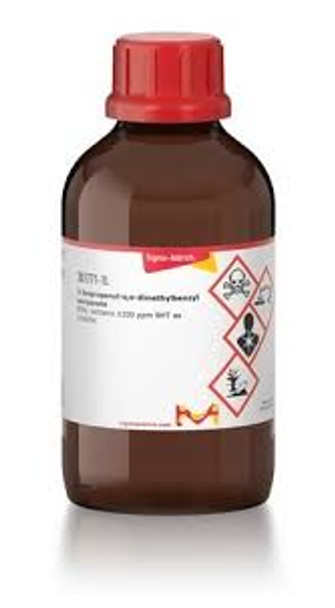Description
Pentane, 500ML
reagent grade, 98%
Linear Formula:
CH3(CH2)3CH3
CAS Number:
109-66-0
Molecular Weight:
72.15
Beilstein:
969132
EC Number:
203-692-4
MDL number:
MFCD00009498
PubChem Substance ID:
329751002
NACRES:
NA.21
PROPERTIES
grade
reagent grade
Quality Level
100
vapor density
2.48 (vs air)
vapor pressure
26.85 psi ( 55 °C)
8.43 psi ( 20 °C)
Assay
98%
form
liquid
autoignition temp.
500 °F
expl. lim.
~8.3 %
refractive index
n20/D 1.358 (lit.)
bp
35-36 °C (lit.)
mp
−130 °C (lit.)
density
0.626 g/mL at 25 °C (lit.)
SMILES string
CCCCC
InChI
1S/C5H12/c1-3-5-4-2/h3-5H2,1-2H3
InChI key
OFBQJSOFQDEBGM-UHFFFAOYSA-N
General description
Pentane (n-pentane) undergoes hydroisomerization in the presence of a nanocrystalline beta (BEA) zeolite.[1] It isomerizes to iso-pentane in the presence of ZSM-5 (Zeolite Socony Mobil-5) zeolite catalysts under hydrogen and nitrogen atmosphere.[2] Platinum catalysts when supported on sulfated zirconia-based solid superacids, promotes chemisorption and effective combustion of pentane.[3]
Application
Pentane may be used for the fabrication of planar lipid bilayers on the films of amorphous PTFE (PTFE) by the “painting technique”.[4]
Pentane may be used in the preparation of n-hexanal via photo-catalyzed carbonylation of the terminal methyl group in the presence of a rhodium catalyst.[5]
SAFETY INFORMATION
Pictograms
GHS02,GHS07,GHS08,GHS09
Signal Word
Danger
Hazard Statements
H225 - H304 - H336 - H411
Precautionary Statements
P210 - P233 - P240 - P273 - P301 + P310 - P331
Hazard Classifications
Aquatic Chronic 2 - Asp. Tox. 1 - Flam. Liq. 2 - STOT SE 3
Target Organs
Central nervous system
Supplementary Hazards
EUH066
Storage Class Code
3 - Flammable liquids
WGK
WGK 2
Flash Point(F)
-40.0 °F
Flash Point(C)
-40 °C





